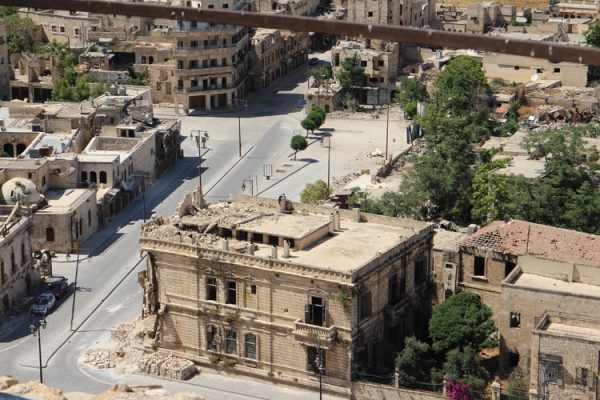The Syrian Observatory for Human Rights (SOHR) is an impartial and independent human rights organisation, which, since its foundation in 2006, pursues the mission of defending the human rights of Syrian people. The SOHR provides a platform for multidisciplinary contributions, which aim to build a country that is free of political persuasions and governed by the rule of law. In pursuit of this goal, the SOHR produced a report to showcase the results of four years of the Syrian regime. The Syrian Regime gained control of the eastern neighbourhoods of Aleppo on 21 December 2016, together with the entire city as a result of a Russian-Iranian-Turkish agreement. This, combined with a siege by regime forces and loyal militias, resulted in displacement of 27,000 residents, including 7,000 fighters.
While the eastern neighbourhoods of Aleppo have been gradually repopulating during the last four years, the war-damaged buildings clearly reveal the devastations that the regime’s military operations have inferred on the city. Air and ground shelling not only damaged residential buildings, but also rendered them inhabitable. Nevertheless, after losing their means of subsistence, several residents were forced to remain in those buildings. Living in such conditions put them under continuous danger, as demonstrated by the number of residents injured or killed in war-damaged and unstable residences. In fact, according to the SOHR, unsafe living infrastructure was a direct cause of 31 deaths in 2019. In particular, 12 people lost their lives in Al-Ma’adi neighbourhood, 11 people in the area of Arid Al-Sabagh in Salah al-Din neighbourhood, three civilians in Al-Jadida neighbourhood and five members of the same family in al-Salihin neighbourhood.
In addition to living in unsafe conditions the residents of Aleppo's eastern neighbourhoods have access to electricity only two hours per day. This forces them to seek alternative solutions to obtain electricity, that is only sufficient to use basic electronic appliances. Similarly, the residents have only intermittent access to water and compensate for this lack through payment of water tanks. The inadequate access to basic services adds up to the high prices of basic commodities, as well as fuels the economic crisis affecting the territories under the regime. The latter resulted in high unemployment rates, affecting half of the men and young people in these areas. Furthermore, a wide share of eastern Aleppo neighbourhoods are controlled by the regime-supported armed militias of “Shabiha of al-Berri” as well as other groups of “Shabiha”, and are subject to widespread thefts, imposition of levies, seizures and burglaries.
The SOHR report summarises the casualties recorded in the area from 22 April to 21 December 2016, namely the period ranging from the beginning of the bombing escalation to the date of bringing eastern Aleppo under the regime’s control. Reportedly, 1,889 civilians, including 360 children and 163 women lost their lives during that period. In particular, 1,607 civilians, including 300 children and 139 women, died due to airstrikes executed by Russian and regime aircrafts on the eastern neighbourhoods controlled by the opposition. Additionally, 282 civilians, including 60 children and 24 women, were killed by tanks, artillery shelling, mortars and rockets in the eastern city of Aleppo. Moreover, thousands of civilians were injured and civilian properties were partially or totally destroyed by the bombings.
The Syrian Observatory concludes its report by renewing its call to hold the perpetrators of Syrian casualties accountable in front of international courts. Additionally, it urges the international community to submit all war crimes and crimes against humanity enacted in Syria for the jurisdiction of the International Criminal Court. This will be a crucial step to help Syrian people find justice and to guarantee that their human rights are being correctly upheld.
To read more, visit:
https://www.syriahr.com/en/196973/
Author: Camilla Lavino; Editor: Aleksandra Krol







